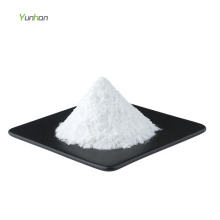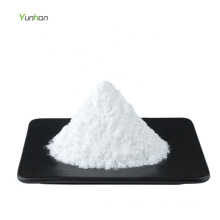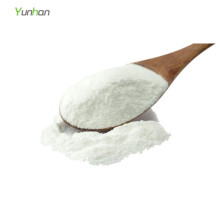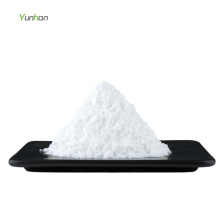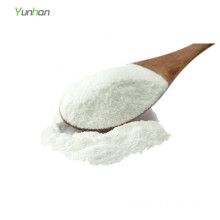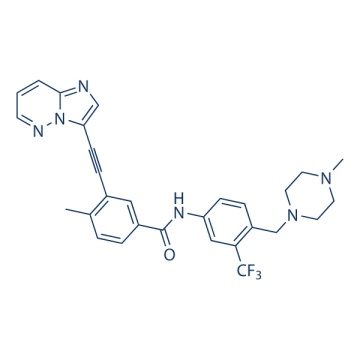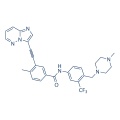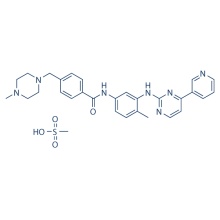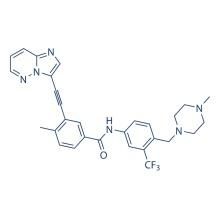Pazopanib HCl (GW786034 HCl) 635702-64-6
Product Description
Molecular Weight:
473.98 Pazopanib (GW786034) is a novel Multi-Target Inhibitor of VEGFR1, VEGFR2, VEGFR3, PDGFR, FGFR, c-Kit and c-Fms with IC50 of 10 nM, 30 nM, 47 nM, 84 nM, 74 nM, 140 nM and 146 nM, respectively.
Biological Activity
Pazopanib potently inhibits VEGF-induced phosphorylation of VEGFR2 in HUVEC cells with IC50 of 8 nM. Pazopanib shows dose-dependent growth inhibition in all synovial
sarcoma cell lines including SYO-1 and HS-SY-II cells. Proliferation of
SYO-1 and HS-SY-II cells is inhibited even at 1 µg/mL of Pazopanib and
is completely abolished at 5 µg/mL. Pazopanib induces G1 arrest, and
thereby suppresses the growth of synovial sarcoma cells. Phosphorylation
of Akts, GSK-3β, JNKs, p70 S6 Kinase, and mTOR is suppressed in
Pazopanib-treated SYO-1 cells compared with that in the vehicle-treated
cells. Pazopanib between 20 m g/mL and 22.5 m g/mL shows an increasing reduction of RPE cell viability.
The mice treated with 30 mg/kg or 100 mg/kg Pazopanib reveals a
significant decrease in tumor burden compared with the mice treated with
vehicle or 10 mg/kg Pazopanib. Treatment with Pazopanib is
well-tolerated and there is no significant difference in the body weight
among the mice in each group.
Protocol(Only for Reference)
Kinase Assay:
[1]
| Kinase enzyme assays | VEGFR enzyme assays for VEGGR1, VEGFR2, and VEGFR3 are run in homogeneous time-resolved fluorescence (HTRF) format in 384-well microtiter plates using a purified, baculovirus-expressed glutathione-S-transferase (GST) fusion protein encoding the catalytic c-terminus of human VEGFR receptor kinases 1, 2, or 3. Reactions are initiated by the addition of 10 μL of activated VEGFR2 kinase solution [final concentration, 1 nM enzyme in 0.1 M HEPES, pH 7.5, containing 0.1 mg/mL bovine serum albumin (BSA), 300 μM dithiothreitol (DTT)] to 10 μL substrate solution [final concentration, 360 nM peptide, (biotin-aminohexyl-EEEEYFELVAKKKK-NH2), 75 μM ATP, 10 μM MgCl2], and 1 μL of titrated Pazopanib in DMSO. Plates are incubated at room temperature for 60 min, and then the reaction is quenched by the addition of 20 μL of 100 mM ethylene diamine tetraacetic acid (EDTA). After quenching, 20 μL HTRF reagents (final concentration, 15 nM Streptavidin-linked allophycocyanin, 1 nM Europium-labeled antiphosphotyrosine antibody diluted in 0.1 mg/mL BSA, 0.1 M HEPES, pH 7.5) is added and the plates incubated for a minimum of 10 min. The fluorescence at 665 nM is measured with a Wallac Victor plate reader using a time delay of 50 μs. |
|---|
Cell Assay:
[1]
| Cell lines | HUVEC cells |
|---|---|
| Concentrations | 0-10 μM |
| Incubation Time | 1 hour |
| Method | Phosphorylation of VEGFR2 is assessed in HUVEC stimulated with VEGF. HUVEC are plated in type-I collagen-coated 10 cm plates in Clonetics EGM-MV medium at 1.0-1.5 × 106 cells/plate. After 24 hours, the confluent cells are serum starved overnight by replacing the growth medium with Clonetics EBM medium containing 0.1% BSA, 500 μg/mL hydrocortisone. Cells are treated with Pazopanib at various concentrations for 1 hour, followed by addition of 10 ng/mL VEGF or vehicle for 10 min. Cells are solubilized in lysis buffer. VEGFR2 is immunoprecipitated using antiflk-1 antibody and analyzed by sodium dodecyl sulfate polyacrylamide gel electrophoresis (SDS-PAGE) followed by Western blotting and detection with antiflk-1 or with antiphosphotyrosine (anti-P-tyr-biotin) antibody. The VEGFR2 phosphorylation level is quantified by densitometry and normalized to the total VEGFR2 level. |
Animal Study:
[2]
| Animal Models | Immunodeficient mice bearing SYO-1 cells | ||
|---|---|---|---|
| Formulation | | ||
| Dosages | 0 mg/kg, 10 mg/kg, 30 mg/kg, or 100 mg/kg | ||
| Administration | Oral administration | ||
| Solubility | 30% PEG400/0.5% Tween80/5% propylene glycol, 30 mg/mL | ||
| * Please note that Selleck tests the solubility of all compounds in-house, and the actual solubility may differ slightly from published values. This is normal and is due to slight batch-to-batch variations. | |||
Conversion of different model animals based on BSA (Value based on data from FDA Draft Guidelines)
| Species | Baboon | Dog | Monkey | Rabbit | Guinea pig | Rat | Hamster | Mouse |
| Weight (kg) | 12 | 10 | 3 | 1.8 | 0.4 | 0.15 | 0.08 | 0.02 |
| Body Surface Area (m2) | 0.6 | 0.5 | 0.24 | 0.15 | 0.05 | 0.025 | 0.02 | 0.007 |
| Km factor | 20 | 20 | 12 | 12 | 8 | 6 | 5 | 3 |
| Animal A (mg/kg) = Animal B (mg/kg) multiplied by | Animal B Km |
| Animal A Km |
For example, to modify the dose of resveratrol used for a mouse (22.4 mg/kg) to a dose based on the BSA for a rat, multiply 22.4 mg/kg by the Km factor for a mouse and then divide by the Km factor for a rat. This calculation results in a rat equivalent dose for resveratrol of 11.2 mg/kg.
| Rat dose (mg/kg) = mouse dose (22.4 mg/kg) × | mouse Km(3) | = 11.2 mg/kg |
| rat Km(6) |
Chemical Information
| Molecular Weight (MW) | 473.98 |
|---|---|
| Formula | C21H23N7O2S.HCl |
| CAS No. | 635702-64-6 |
| Storage | 3 years -20℃Powder |
|---|---|
| 6 months-80℃in solvent (DMSO, water, etc.) | |
| Synonyms | |
| Solubility (25°C) * | In vitro | DMSO | 17 mg/mL (35.86 mM) |
|---|---|---|---|
| Water | <1 mg/mL ( | ||
| Ethanol | <1 mg/mL ( | ||
| In vivo | 30% PEG400/0.5% Tween80/5% propylene glycol | 30 mg/mL | |
| * <1 mg/ml means slightly soluble or insoluble. * Please note that Selleck tests the solubility of all compounds in-house, and the actual solubility may differ slightly from published values. This is normal and is due to slight batch-to-batch variations. | |||
| Chemical Name | 5-(4-((2,3-dimethyl-2H-indazol-6-yl)(methyl)amino)pyrimidin-2-ylamino)-2-methylbenzenesulfonamide hydrochloride |
|---|
Molarity Calculator
Dilution Calculator
Molecular Weight Calculator
Contact us if you need more details on 635702-64-6. We are ready to answer your questions on packaging, logistics, certification or any other aspects about Pazopanib HCl 635702-64-6、GW786034 HCl 635702-64-6. If these products fail to match your need, please contact us and we would like to provide relevant information.
Product Categories : Angiogenesis > Bcr-Abl Inhibitor

